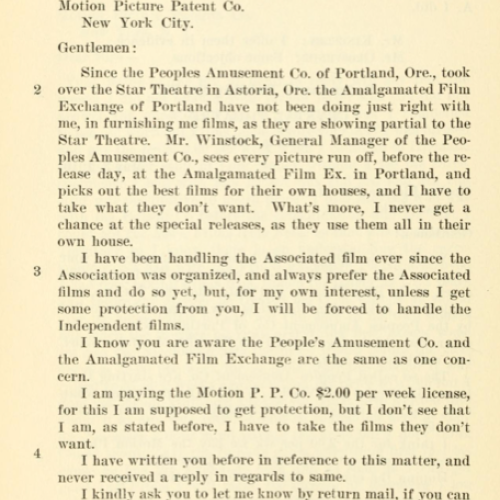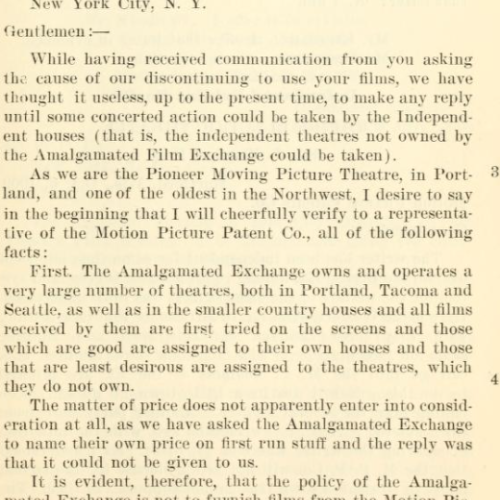Film distribution and licensing agencies play a major role in how films are dispersed and delivered to individual theaters in a specific area. One of the major distribution companies in the Pacific Northwest during the early 1900s was the Amalgamated Film Exchange of Portland and Seattle. This exchange company was one of the only licensed exchanges in the area and additionally owned quite a few theaters under the name of the People's Amusement Company throughout Oregon and Washington. Although the ease of the exchange company and theater being managed by the same company seems like it would be favorable, this actually caused quite a bit of controversy with other individually owned theaters. In a book of court documents against the Motion Pictures Patent Company from 1913, the Amalgamated Film Exchange was referenced in multiple letters stating unfair treatment and favoritism for which theaters got certain films. In one letter of complaint, Henry Newman of the Crystal Theater in Astoria, Oregon expressed his concern for the Star Theater, owned by the Peoples Amusement Co., getting the first pick for feature films further advancing the competition between the two theaters. Newman shares that the manager of the Portland Amusement Co. previews the films before they are released and gets first pick of the films for use in the company-owned theaters, leaving the Crystal and other theaters alike with whatever is leftover. A similar claim was presented in a letter from B. E. Gellerman who managed a theater in Portland. In Gellerman's letter he disclosed that when discussing the cost to obtain the first run of a feature film, he was told by the exchange that he was not able to obtain the film at any price. These are just two of the many examples of the unjust treatment that many theaters experienced with the Amalgamated Film Exchange and the associated theaters under the Peoples Amusement Co.
Controversy of the Favoritism within the Amalgamated Film Exchange Co.
May
20
2022
Categories
- Newman, Henry Letter to Motion Picture Patent Co., May 3, 1910, p1388. In the District Court of the United States for the Eastern District of Pennsylvania. United States v. Motion Picture Patents Co. et al. Record-Volume III. 1913. Media History Digital Library
- B. E. Gellerman. Letter to Motion Picture Patent Co., May 3, 1910, p1389. In the District Court of the United States for the Eastern District of Pennsylvania. United States v. Motion Picture Patents Co. et al. Record-Volume III. 1913. Media History Digital Library

